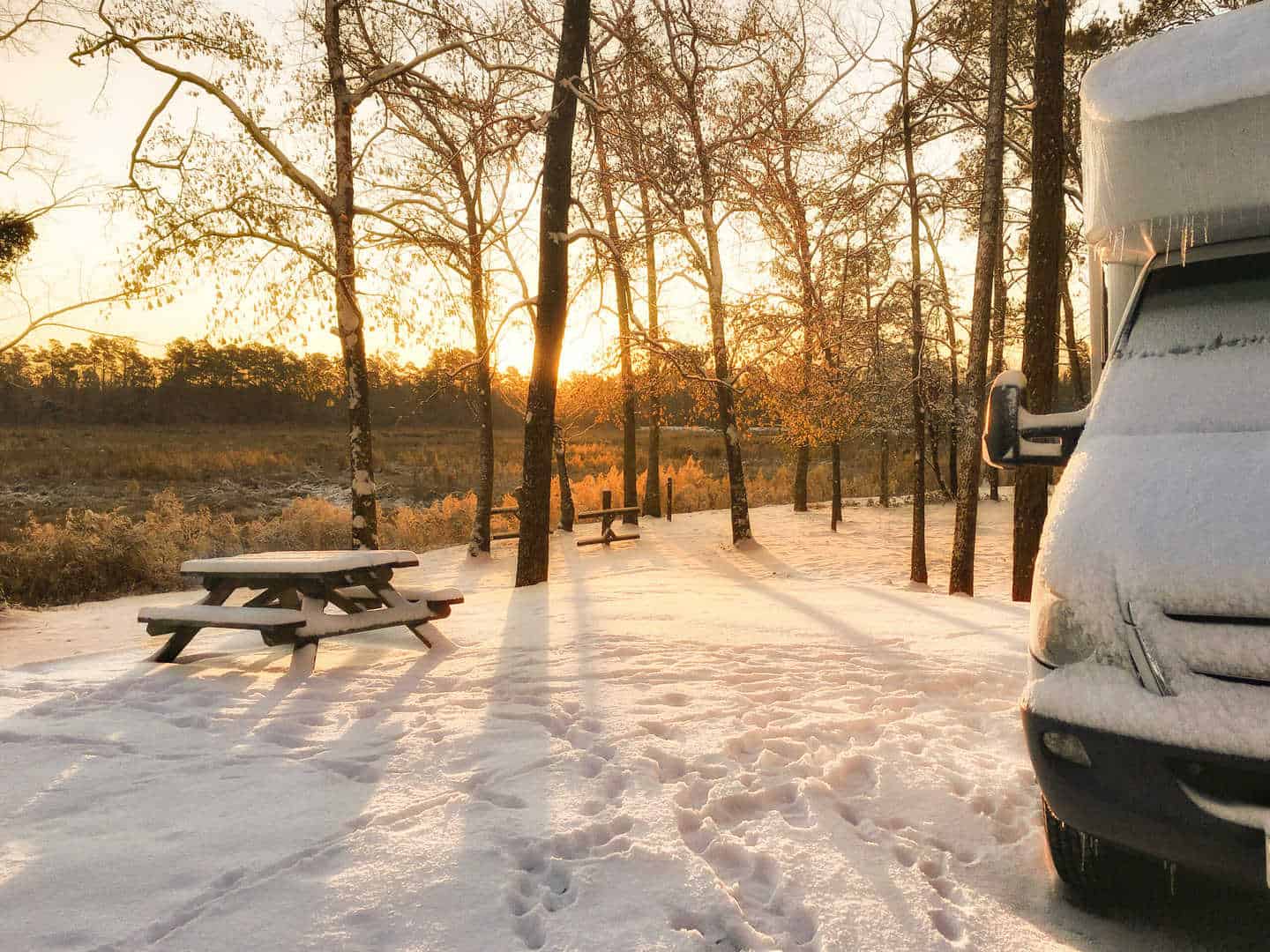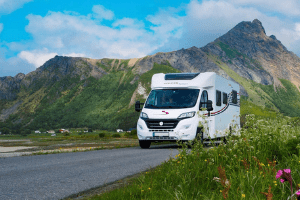Living in a motorhome in the winter can be thought of as extreme thanks to the usually harsh British weather. However, we like to think of it as an adventure where you’ll successfully be able to overcome any challenges regarding warmth and cosiness. With this in mind, your choice of motorhome is crucial.
Before we get stuck into the details of your wintery adventure, it’s wise to travel south during this time of year. A motorhome makes it simple to travel to alternative locations, and the south coast of England is an ideal spot to enjoy the best of this frosty season ahead. It’s far more likely to be warmer than other UK locations (though this isn’t a guarantee!).
It’s great to know that it’s perfectly legal to live in a motorhome in the UK, as long as your motorhome is in perfect working condition and the correct on-the-road legalities have been applied. When it’s this easy, there’s really no reason not to jump on board and embark on an attractive seasonal adventure.
Why you should live in a motorhome this Winter
A motorhome is mobile
So we’ve recommended that you head south for this time of year – but don’t let that be gospel. Any time you feel like upping sticks and relocating, you can! If you’re an adventurous person, bingo: this is likely an ideal lifestyle for you. When it’s cold outside, even better, as you can enjoy full freedom and beautiful winter scenes while always knowing that your own bed awaits. Who knows – you may even find a place to park, such as a mountainous resort, well known for their low sprawling. And, if you love skiing, you can go ahead and use your motorhome as you go ahead with your skiing adventure – and hang around as long as you want!
Living in a motorhome is cheap
How cheap is cheap? Cheaper than a normal residential home: a motorhome is much less expensive to run day-to-day. Of course, you’ll have to think about parking fees wherever you are, but most campsites are very affordable (particularly during winter). Even better is that if you do find somewhere you’d like to stick around for, you don’t have to think about petrol or maintenance until you get moving once again – easy!
Motorhomes do have to be bought in the first place, of course, which is something worth saving for if you’ve not already started. However, even insurance can be kept at a low cost if you know where to look. Insurance will help keep your mind at ease from risks throughout the season.
Motorhomes are easy to clean
Thanks to their typically compact size, motorhomes naturally have less square footage so are easier to keep clean than a standard living space. This means that you can spend less time worrying about upkeep and cleanliness as you go about your day-to-day activities and more time to enjoy beautiful frosty scenes outdoors. A quick sweep of the floor and you’re good to go! Beats vacuuming an entire house any day.
Motorhomes provide you with adventure
Motorhomes provide you with total freedom and a huge sense of adventure as you realise that everywhere is possible to get to and stay at for as long as you like. It’s a great way to make friends with like-minded travellers and you’ll never be bored. And if you are? Move on!
So, can you live in a motorhome? We still believe that living in a motorhome in the winter is a fantastic adventure to be had by all, but to clear up any remaining doubts, here are some final tips to consider.
Tips on living in a motorhome during Winter
Keep frost at bay
Prepare your motorhome for winter living so that it cannot be destroyed by frost. You can do this by making some modifications both inside and outside so as to protect your motorhome from frost damage.
Double-check manufacturer details to ensure that you follow correct procedures, but here are a few tips we recommend:
– Run the hot water
Running hot water in your motorhome ensures protection in case temperatures go exceedingly low, as waterpipes will not freeze, expand and break. Prevention is better than cure, as very few water systems are covered by insurance.
– Don’t leave the handbrake on
Leaving your handbrake on could make it seize up in the low winter temperatures, which of course isn’t a good idea.
– Stay ventilated
You might be reluctant to do this if you’re worried about how to stay warm in your motorhome this winter. However, ventilation ensures you avoid the formation of mildew on the walls. A winter fridge vent is a great idea – check your ideal motorhome has one of these installed. It’ll make living in a motorhome in the winter much easier for you.
Keeping busy
Perhaps you’re worried about when the weather is too chilly to set foot outdoors? No worries – winter motorhome living is the perfect opportunity to brush up on skills such as cooking. Classic British meals such as lamb hotpot are a great way to stay cosy as the nights draw in and will keep your energy levels up in the healthiest of ways – a perfect indoor winter remedy while you enjoy your motorhome adventure!
How to stay warm in your motorhome this Winter
You really don’t want to experience health problems associated with the winter conditions – even the common cold can knock you back for six. In case your motorhome doesn’t have a proper heating system, ensure you stay warm by dressing accordingly. Warm jumpers, fleece jackets, mittens and gloves must be part of your everyday dress, even indoors if warranted. A heated blanket is also a good idea because it will enable you to stay warm in your bed at night.
You can also use a dehumidifier and draught skirts. A dehumidifier prevents stuffiness inside the motorhome while the draught skirts prevent cold air from coming into the motorhome which in turn reduces internal heat loss.
Winterising and enhancing your motorhome comfort
How to winterise a motorhome for winter living depends on how it is built by its maker. It also depends on how you want to use the vehicle and your potential travel locations. There are contrasting insulation standards that have to be regulated according to the current weather conditions.
Motorhomes are made of different grades. Depending on the grade of your motorhome, it will provide you with a different level of heating and insulation. Grade 3 heating and insulation is by far the best as it can raise the temperature of your motorhome from lower temperatures and at a faster rate in comparison to grade 1 & 2 heating and insulation. Grade 3 heating and insulation is tested by raising the inside temperature from -15 to 20c in 4 hours after the motorhome has been at -15 for 10 hours. This will enhance your winter living experience by preventing you from feeling cold even in the harshest of conditions.
You can insulate your motorhome further by using thermal curtains to ensure that no further heat is lost from your cosiest home yet.
Still wondering how to winterise a motorhome for winter living? Take a look at the following:
1. Make sure that you have a quality windscreen cover
A quality thermal screen cover will help prevent condensation from forming on the inside of your windscreen.
2. Avoid boosting your heat levels by using gas a hob
Why? Gas hobs release carbon monoxide when used in an enclosed space, and we all know how dangerous it is to stay in an enclosed space with carbon monoxide. It can lead to loss of consciousness or life altogether, so strictly only use a gas hob for cooking, and ensure there is airflow throughout your motorhome when doing so.
3. Think woollen carpets
A carpet makes everywhere warmer and cosier, so find a woollen floor carpet and underlay it before laying it down to improve insulation all round.
4. Make sure you buy high quality draught skirts
It will keep your motorhome warm and prevent strong winds from entering the motorhome.
5. If you don’t have a working heating system, repair it!
Winter is cold. Make sure your motorhome has a working heating system that ideally uses wet heat to transfer energy. This is because it distributes heat evenly in your motorhome. Make sure that you have power at all times because it requires electricity to function.
6. Use propane gas
Propane gas can generate more pressure than Butane at the same temperature which is advantageous as it also means that Propane works better in low temperatures, keeping your motorhome warm even in those freezing winter conditions.
Food for thought
People have different tastes and requirements of what they like in a motorhome, so there is no way you can say that there is one best vehicle for winter living. Some prefer a more luxurious motorhome with all the modern amenities, while some go for a smaller and much simpler motorhome with just the basic necessities. Choose what’s best for you and make the most of it!
At the end of the day, what matters most is your budgetary allocations and priorities. It’s important not to forget to check that you have your insurance sorted before setting off south or elsewhere – insurance that is best for your schedule and lifestyle. Keep safe, stay warm and dry, and enjoy the best of British winter!
At Comfort Insurance we have the right level of cover when deciding to live in your motorhome. That’s why our customers rate our service highly on Trustpilot.
You can start your Comfort Insurance quote online now or speak to a friendly and knowledgeable member of the team on 0208 9840 666.













